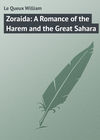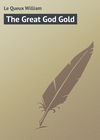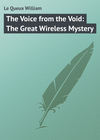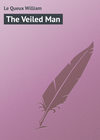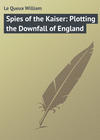Loe raamatut: «Zoraida: A Romance of the Harem and the Great Sahara», lehekülg 21
Over sharp rocks and treacherous tufts of hulfa grass, through pebbly ravines and soft sand, into which the horses’ hoofs sank deeply at every step, we spurred onward. Zoraida, the beauteous Bringer of Victory, led us to the attack, and of that host none were afraid. From four directions the pirates of the plains were advancing on the City of the Ahír, and all were enthusiastic and confident except myself.
What, I wondered, would be the outcome of this carefully-planned attack on the great Fáda? For Zoraida’s safety I trembled. What her fate would be should she chance to fall into the hands of the brutal janissaries, I feared to contemplate. However, though no word was exchanged between us, I was determined to fight by her side, to protect her from her enemies, and dash with this horde of thieves onward to the city in which my one hope was centred.
The Arab had spoken the truth. We had the moon with us, and cared naught for the stars. Zoraida was our light, and we were following her, stout-hearted and strong-armed, prepared to plunder, to murder, to deal death and to spread desolation at every step.
Chapter Thirty Eight.
Hadj Absalam’s Decree
The attack delivered during the moonlit hours was sharp, decisive, and, being unexpected, was at first little short of a massacre. Yelling with wild, fiendish delight, my companions, Zoraida at their head, swept onward through the gate of Agadez up to the great, gloomy portals of the Fáda, ruthlessly shooting down those who attempted to bar their passage, and engaging in desperate mortal combat with the armed guards, who offered stubborn resistance.
Our success, however, was brief, for our reinforcements had unfortunately not reached us. Recovering quickly from the first shock, the alarm was at once sounded throughout the city. All those capable of bearing arms united to repel us, and as the janissaries in strong bodies poured forth from the Palace gate, the fray soon became fierce and bloody. The Ennitra struggled with desperate courage begotten by the knowledge that they were surrounded by hundreds of the defenders, who would slaughter them and torture those who fell into their hands as prisoners. Knowing not a man would survive if they were defeated, they fought on, madly reckless in their insatiable desire for blood, as with their keen knives they dealt deathblows at those who were defending the gateway, being in turn slashed and maimed by the keen scimitars of the janissaries, until the roads ran with blood, and our horses leaped and stumbled over piles of dead and wounded.
The fight was desperate; the carnage horrible.
On every side men yelled and struggled, while the ill-fated ones fell to earth and died with curses upon their lips. The scene was awful, almost demoniacal, for the shrieks of the vanquished, mingled with the shouts of the victors and the continuous rattle of rifles, drowned the clash of arms.
Amid the desperate conflict I kept as close to Zoraida as possible, though the Ennitra pressed around her, fiercely repelling those who attempted to capture their banner. The Daughter of the Sun, sitting on her sable stallion, with face firm set, gripped in her bejewelled hand a small curved dagger, which from time to time she flourished over her head, urging her outlaw cavaliers to valiant deeds. Time after time her slim, supple figure showed in the very thickest of the mêlée, as with desperate rushes we dashed onward towards the great horse-shoe arch which gave entrance to the Fáda, being, alas! on each occasion met with such strenuous opposition that we were compelled to fall back again, leaving dozens of corpses strewn upon the roadway. Men and horses were hacked in a manner truly horrible by the scimitars of the Sultan’s guard, and once or twice Zoraida herself had a narrow escape of death. At moments of extremest peril she behaved in a manner that would have done credit to any trained soldier. Once, as I engaged a well-armed janissary hand to hand in mortal combat, I saw that the guards had broken the ring of fierce warriors who had formed themselves around our standard and dashed into the centre of the group, causing a frightful conflict. Fighting at such close quarters, the long-barrelled guns of the Ennitra were useless, therefore they were compelled to use their knives and swords. Just as, by a lucky cut, I had slashed the right arm of my adversary, I turned to witness a gigantic guard of the harem rush up to Zoraida, brandishing his heavy scimitar, a formidable weapon that I had often burnished and whetted.
“Die, thou accursed son of Eblis!” he shrieked loudly, bringing down his broad, curved blade, that gleamed for a second in the moonbeams; but the fearless leader of the marauders had already become aware of her danger, and, lifting her left hand until it was only a foot from his great brutal countenance, fired her old-fashioned pistol full into his face. The sword fell from his paralysed fingers, and back he staggered next second with half his skull blown away.
Her escape was almost miraculous, yet she betrayed not the slightest trace of fear, although the rust of dust had settled upon the mirror of her beauty. Without a second glance at the body of her slain enemy, she sat her black horse firmly and well, re-primed her pistol, and then fought on with calm courage, heedless of the fact that those whom she led were slowly but surely being swept into eternity by the well-organised opposition they were encountering. Again and again the soldiers of Abd-el-Kerim closed around us in a frantic endeavour to capture the green banner that swayed gloomy and ominous in the brilliant night; but with dogged persistency our men, better armed than their adversaries, fired their rifles with deadly effect, and stood together prepared to fight on desperately until the end. Many were the deeds of cool daring I witnessed during that midnight hour, while men in white burnouses, looking almost ghostly in the deep, enmassed shadows cast by the high walls of the Fáda, struggled with the gorgeously-attired retainers of the Sultan.
Unfortunate wretches, mortally wounded, struggled on till they sank of sheer exhaustion and were trampled to death, and their fellows, some horribly mutilated, with dark, ugly stains upon their burnouses, fought again ere they died, killing their enemies in a frenzy of mad revenge. The encounter grew more desperate every moment. Our hands and faces were besmirched with blood, as larger and more impassable grew the barrier of the slain.
Hadj Absalam had miscalculated the time which must be occupied by the march of our reinforcements, and we had made the assault too early!
Again the heavy gate of the Fáda opened; again there emerged another body of troops. For a moment they halted, then there was a bright, blinding flash, as into our midst a volley was poured, by which a dozen men around me fell from their horses dead. Breathlessly I glanced towards Zoraida, half fearful lest a bullet should strike her, but breathed more freely when I saw her unharmed, still brandishing her knife aloft and shouting words of encouragement to the desperate group of horsemen pressing around her.
“Courage! brothers, courage!” she shouted. “Keep thine enemies at bay, for ere long thou shalt seek revenge within yonder walls. Give no quarter. Let thy strong arms sweep to earth the gilded popinjays of the Sultan!”
“Behold!” cried Amagay, commanding the janissaries, and speaking in a voice that sounded loud above the din of battle. “Lo! the horseman who commandeth the Ennitra seemeth frail, like a woman! What trickery is this? Falter not, fight on! Let not thy scimitars return unto their scabbards until all have fallen!”
Responding to these words, the janissaries made an onward rush that almost overpowered us. With great difficulty, however, we managed to make a stand against it, firing our rifles and slashing at our adversaries in frantic desperation, just managing at length to repulse them sufficiently to prevent our banner from falling into their hands. A serious attack had been made upon Zoraida and Hadj Absalam, but both had struggled with redoubled energy, succeeding in warding off the repeated murderous blows levelled at them.
Those moments were critical ones. Each of us felt that a second rush as powerful as the first would totally annihilate us.
Our fate, indeed, seemed sealed.
Just as our enemies fell back a little, I managed to draw so close to Zoraida that my hand brushed her silken robe. As I reined up, she shouted an order, a dozen rifles rang out, and in a moment the conflict became even more fiercely contested than before. One by one, however, our men dropped their arms and fell from their horses, never to mount again, and I could see that, with the exception of the couple of dozen old men whom we had left on the previous day in charge of the women, camels, and tents, nearly three-fourths of our body had been killed or wounded.
Beside Zoraida I sat in the bright moonbeams, anxiously on the alert. When I saw how critical was our position, I became regardless of her injunctions, and cried —
“It is useless! Let us fly and save ourselves!”
With a strange fire in her beautiful eyes, she turned quickly upon me.
“No,” she answered calmly. “Have courage, O Cecil! Dost thou not remember what stake thou hast in the result of this attack?”
Again the rifles of the defenders belched forth their ominous red flashes, as amid the din and rattle a perfect hail of bullets whistled about us; yet she seemed to shed a charmed halo around her, for neither Hadj Absalam nor myself were struck. With teeth firmly set, we struggled on, cutting, slashing, striking death at every blow, amid a scene indescribably weird and ghastly, until each well-delivered volley of the defenders felled dozens of our band to earth, and I knew that the slaughter of my undaunted companions-in-arms would be complete.
The fortune of the fight trembled in the balance. Zoraida’s cool, inspiring demeanour and encouraging words stirred the nomadic Ennitra to bold, fearless deeds, and many were the feats of prowess the brigands of the plains in that dark hour accomplished. My life was saved by one of the faithful followers who had assisted Halima and myself to escape. A gigantic, fierce-eyed negro slave of the Fáda had rushed towards me, brandishing his crooked jambiyah, and I had fired, missing him. Next moment he closed with me, gripping my throat with long, sinewy fingers, as with a demoniacal, exultant laugh he raised his knife to plunge it deep into my breast, when Halima’s slave, fortunately noticing my peril, raised his sword and clave my enemy’s skull so swiftly that the warm blood spurted forth over my hands. Without uttering a sound, the dark, evil-visaged brute who intended to kill me staggered and fell back stone dead, while I remained breathless but unharmed.
I gasped a word of thanks to my deliverer, but, shrugging his shoulders, he merely answered, “The Ennitra assist those who fight with them side by side, be they Infidels or Allah’s chosen. Thou art our friend and the friend of the Lalla Halima, therefore we are loyal unto thee, and require no thanks for obeying that which is written.”
“May Allah honour thee!” I said, fervently thankful, fully realising how narrowly I had once again escaped a violent end.
“And may He be as a lamp shining upon thy path,” the man murmured in pious response.
In the desperate onslaught made a few minutes later by the soldiers of the Sultan, now reinforced by a squadron of horsemen who had approached with all speed from the opposite side of the city, Zoraida and I found ourselves together in the thick of the fray. Grappling with their enemies, the Ennitra, with all their bellicose instincts now thoroughly aroused, closed with them in a terrible death-struggle. Each desert-wanderer, determined to sell his life dearly, bade defiance to the great body of janissaries, eunuchs, palace guards, and soldiers, and, armed to the teeth, cut, thrust, and charged, pressing the defenders hard, bearing the brunt of the fight, and showing a bold front in a manner truly astonishing.
With their white drapery flowing in the wind, as they spurred on their horses in repeated efforts to successfully storm the gate of the Fáda, my companions fought like demons. But the defenders held together in solid phalanx, and repulsed us time after time, until many more of our bold, undaunted horsemen lay weltering in their blood.
Again and again Zoraida, whose slim form still showed under the dark standard of the outlaws in the very midst of the desperate conflict, shouted words of encouragement, and each time we swept forward upon the stubborn ranks of the janissaries, only to be ignominiously driven back under a withering fusillade of bullets. Hadj Absalam’s gruff voice, raised in desperate imprecation, roared above the din of the fray, but he was unheeded. They obeyed only the commands of the Daughter of the Sun, whom they still implicitly believed would lead them to victory.
In deadly embrace we fought with ferocious strength, grappling our adversaries, and using our knives with horrible fiendishness. Janissaries and eunuchs, slashed and mutilated by the dexterous blows of my dauntless fellow-horsemen, fell groaning to earth, staining the burnouses of the outlaws with their blood; but even then, when slight success aroused redoubled energy within us, any hope of the investment of the Fáda still seemed utterly forlorn.
Suddenly above the noise and tumult there was a loud rumbling, which at first I thought was distant thunder.
“Hearken!” eagerly shouted Zoraida, at that moment only a few feet from me. “Give ear unto me! Lo! it is the rolling of the Drum of Nâr! Fight on! Our brothers are advancing! For evil men Hell, the Worst life; for the righteous the Best Mind, Paradise!”
With a shrill whoop, the Ennitra took up the last sentence as a war-cry, and, with courage strengthened by the knowledge that at last assistance was at hand, dashed forward wildly towards the great arched gateway, many of them being in their reckless onslaught impaled upon the defenders’ spears. Then, ere five minutes had passed, with loud, reassuring shouts, mingling with the monotonous thumping of the Drum of Victory, the three bodies of the Ennitra, who, it afterwards appeared, had effected a junction near Tanou-n-Toungaïden, made a vigorous demonstration, by which, in the course of a quarter of an hour, the defenders became hemmed in between two galling fires.
Closely pressed, they were at last, after holding out with dogged resistance until the first flush of dawn, driven back against the gloomy walls of the palace, and there slaughtered without mercy.
The tide of battle turned in favour of the brigands.
There ensued a revolting massacre, from which Zoraida, breathless and panting, turned and shut out its sight by covering her eyes with her delicate hands. The soldiers of the Ahír, finding themselves overpowered by the dreaded band whose vengeance was feared throughout the Soudan, threw down their arms and craved for quarter. But the Ennitra had given rein to their savage bloodthirstiness, and no words from their beautiful leader could avert that fierce, horrible brutality which caused them to be held in dread. Upon their knees proud janissaries of the Sultan Abd-el-Kerim sank in the blood of their comrades, crying hoarsely for mercy, but none was shown them. Dismounted, the men whom Zoraida had rallied and incited to victory threw themselves upon their adversaries, butchering them in cold blood. Murder, mutilation, and torture were rife everywhere in the vicinity of the Fáda, and as the bright streaks of saffron spread in the east, heralding the sun’s coming, the massacre was awful.
“Spare the Mesállaje!” cried Zoraida, pointing to the square minaret that loomed dark against the grey of dawn. “Defile not the Great Mosque! The curse of the One of Might rest upon any who dare to enter the holy place with blood upon their hands!”
Quickly the order, shouted aloud, was passed from mouth to mouth, and a few moments later, Zoraida, as she rode swiftly past me, exclaimed —
“With the Mosque free from attack, thou wilt of a surety find the imam thou seekest. When it is time I will tell thee;” and away she galloped to where a large force of our people, climbing over the great heap of slain, were battering in the heavy gate of the Fáda, that for centuries had withstood all attack.
At last, by dint of supreme effort, the door was burst open, and with loud, victorious yells, there rushed into the first of the great courts a legion of ferocious brutes, who ruthlessly murdered those who stood in their path. Guards, servants, courtiers, and eunuchs were ferreted from their hiding-places and slaughtered with horrible ferocity, as, headed by Hadj Absalam under his green standard, the thieving hordes swept onward through the luxuriant palace to the Court of the Eunuchs, with which I was so familiar. Then, storming the three great doors of the Sultan’s harem, they at last gained that most luxuriant portion of the Fáda.
Zoraida drew back, as if fearing to enter, and for a few seconds stood beside me in the gateway trembling. Summoning courage at last, she allowed herself to be carried on over the bloodstained floors of polished sardonyx and agate into the great arcaded courts, with their columns of marble, plashing fountains, and cool palms. Huddled together in little groups stood the beautiful prisoners of the Sultan, with fear depicted on their handsome faces, as if they had received forewarning of their untimely end. Uttering fiendish yells, the flint-hearted Ennitra, intoxicated by success, bounded towards them, and the awful scenes of loot and massacre that ensued I will not attempt to describe. Suffice it to say that no mercy was shown even to the women. Their jewels were torn from them, fingers on which were valuable rings being unceremoniously hacked off, and their slim white throats and bare breasts were cut and slashed with hellish fiendishness. A few of the more beautiful were chosen by Hadj Absalam to grace his own harem, but the remainder were simply butchered with merciless ruthlessness, the jewels filched from them being flung unceremoniously into a great heap in the centre of the gorgeous Courts of Love, and over it a dozen of the outlaws mounted guard.
The massacre was sickening. Piercing screams of the women as they fell under the knives of their pitiless captors echoed along the great arcades, mingling with the jeers of the outlaws and the hoarse cries of the dying. Blood ran across the polished floors, and, trickling into the fountains, tinged their waters, the walls of marble were bespattered with it, and the once-beautiful Courts of Love were rendered hideous by their piles of mutilated corpses, and became a ghastly Inferno, to be remembered with a fearsome shudder until one’s dying day.
Horrified by the terrible sights I had witnessed, I endeavoured to draw back, but with loud shouts the crowd, excited to madness by their work of murder and pillage, made a sudden rush to the Sultan’s pavilion, and involuntarily I was carried onward.
“Seek Abd-el-Kerim!” they cried. “Kill him! kill him!” Through the harem-garden, along the edge of the great lake, and on into the Hall of the White Divan they pressed. On entering, we found under the great baldachin of silk and gold the young Sultan, with his Grand Vizier Mukhtar and Amagay, the chief of his eunuchs, on either side, standing erect, regarding our entrance with regal air and unflinching eye. He had drawn his scimitar and was prepared to defend himself.
“What meaneth this intrusion?” he cried, the fierce fire of anger in his face. “Verily hast thou rushed into the Wrath, and the blow of destruction shall descend upon thee!”
“Spare us!” cried Mukhtar, rushing forward, trembling, cringing coward that he was.
“We are thy slaves,” added Amagay, throwing away his sword. “Have mercy upon us! Take what thou mayest, but slay us not!”
The fierce, dishevelled band, heedless of all appeal, dashed onward, led by Hadj Absalam. A dozen men rushed forward to dispatch the Sultan, but the latter, wielding his jewelled scimitar, felled the first outlaw who approached, inflicting a mortal wound. Next moment, however, the youthful ruler of the Ahír, pulled unceremoniously off the divan, was struggling powerless in the hands of his ragged conquerors.
For his curses they cared naught, but at a signal from Hadj Absalam, who had in the meantime mounted to the deposed monarch’s place, Labakan stepped forward, armed with the executioner’s heavy doka, which he had just found while searching for plunder.
“Let him die!” exclaimed Hadj Absalam briefly.
“Ah! spare me, O conqueror!” gasped the unhappy youth. “It is written – it is written that the blessings of Allah rest upon the merciful! Spare me!”
But the Sultan, pale and haggard, was quickly forced to his knees upon the polished pavement before his own divan and held with his hands behind his back. Piteous were his appeals, but they softened not his captors’ murderous, sanguinolent hearts. The great diamond aigrette was ruthlessly torn from his turban and handed to the robber Sheikh, and then, as the men held him down firmly, Labakan stepped forward, and, swinging the doka with both hands, smote off his head at a single blow.
The body, quickly despoiled of its jewels, was kicked aside into a corner, while the head, mounted on a spear, was sent forth into the city in order to strike awe into the hearts of those citizens who refused to submit to the conquerors.
Mukhtar and Amagay were also decapitated in like manner and without ceremony by the villainous Labakan, who, judging from the self-satisfied grin upon his sinister countenance, delighted in the gruesome duties of his self-assumed office. Once he glanced at me and smiled. Doubtless it would have afforded him considerable pleasure to strike off my head by the same means.
In their frenzied thirst for blood, many of my companions, rushing onward, pillaged the Sultan’s private apartments and the Treasury. Thence they went to the Hall of Audience.
Here a band of janissaries at first made a desperate stand, but they were eventually butchered, even to the last man.
Through the city wildly yelling bands of the Ennitra were rushing with fire and sword. The hours were spent by them in murder and pillage, in mutilation, in every conceivable kind of nameless atrocity. Into the houses they rushed, penetrating to the apartments of the women, murdering the occupants, and carrying off all that was valuable. Deeds of violence and lawlessness were committed with cruel brutality and heartlessness; women and children were slaughtered before the eyes of husbands and fathers, who in their turn were also murdered in cold blood. Many went down on their knees, supplicating with heads bent to the ground, crying for quarter, and in that attitude were butchered mercilessly by their conquerors. In the open space called the Azarmádarangh between four and five hundred young men and women had by noon been collected to be sold as slaves, and as each hour passed, others were added to the number. Some attempted to escape, and were shot down in consequence, but the majority gave themselves up to their fate, and squatted on the ground silent and morose. The women wept and wailed, but the men made no complaint. They had fought, Fortune had deserted them, and their Sultan’s head was being carried around Agadez to the monotonous thumping of the ancient Drum of Nâr. Upon the pinnacles and minarets the great vultures of dirty-greyish plumage with naked necks were awaiting impatiently the feast that the marauders had provided for them, and the captives, noticing them, regarded their presence as an omen that the power of the Sultans of the Ahír had been broken for ever.
In Abd-el-Kerim’s pavilion, where I remained, Hadj Absalam, with his banner planted over the great canopy, was seated upon the divan with Zoraida at his side. While the work of plunder was proceeding throughout the Fáda, the apartment was filled to overflowing by a crowd of the less excited of his bloodthirsty band. Labakan having taken his stand on the other side of the chieftain, resting upon his great bloodstained executioner’s sword, Hadj Absalam at length commenced an address to his people. But the latter, after he had uttered half a dozen sentences, mainly egotistical of his own prowess, refused him further hearing, crying —
“Let our Daughter of the Sun speak, O Mirror of Virtue! We trusted her and were not afraid. Let her have speech with us!”
“Speak then,” he said, annoyed, turning to Zoraida. “May the fear of thy Ruler lie upon thy lips.”
Casting a quick inquiring glance at him, she smiled pleasantly upon those around her, saying —
“Lo! thy Sheikh, thy Branch of Honour, hath led thee through these courts of the Fáda – wherefore dost thou not honour him?”
“It was thy voice alone that rallied us when we were failing, and guided us at the critical moment unto a victory great and glorious!” cried one of the warriors, a statement that was hailed with extreme approbation.
Gracefully she bowed in recognition of the compliment, saying, “What I have done hath been in accordance with the promise given unto me. Once again have I led thee to victory, though it be for the last time.”
A murmur of dissent went round, and a voice inquired the reason.
“Because,” she said, – “Because thou hast conquered the City of the Ahír, therefore thou hast no further need of my services – ”
“I have. Thou shalt now become Pearl of my Harem!” Hadj Absalam interrupted, with a scowl of displeasure upon his furrowed face.
This declaration produced a sensation almost electrical, and it seemed that, even though the prospect might be distasteful to them, none dare challenge the autocrat. Zoraida, too, turned pale, clenched her tiny hands, and bit her lips to the blood.
“Brothers,” she gasped, her voice faltering, “I, Daughter of the Sun, am thy sister. Oft-times have I risked my life to ensure success in thy forays. Art thou still loyal unto me?”
“We are,” they answered, as with one voice.
“Then I fear not mine enemies,” she exclaimed, drawing herself up and flinging back her blood – besmirched silken robe with a defiant air. “To-day thou hast broken the power of a great Sultan and beheaded him; thou hast invested the palace that all thought impregnable; thou hast captured many slaves, and thou hast secured plunder almost as valuable as the Treasure of Askiá, which lieth hidden. I led thee hither, but the tenure of my leadership is at an end. Bow now unto the authority of thy Sheikh, and treat me only as one who hath rendered thee a service.”
“It is but fitting that, now we have conquered Agadez, thou shouldst become Malieah of the Ahír,” Hadj Absalam protested. “I appeal to thee, my people. Do I give voice unto thy wish?” The armed men looked at one another in hesitation. Then one, a big, hulking, half-witted fellow, stepped forward, and, turning back to his companions, exclaimed —
“Is not the beauty of our Daughter of the Sun known throughout the Great Desert; is she not our Lady of Wondrous Beauty, with whom none can compare? Did not the great Sultan, Mulai Hassan, of Fez, offer one hundred bags of gold for her? Why should she not grace our people by becoming the chief wife of our wise and just ruler? She would still retain her power to bring victory unto us, and would at the same time reflect upon us perpetually the light of her beauteous countenance.”
Labakan grinned. It was, I felt sure, one of his devilish schemes. “Are any of the houris whom thou hast spared in yonder harem half as beautiful as the Lalla Zoraida?” he asked. “Surely she with the loveliest face should become Queen?”
“Hearken unto me, O my brothers!” Zoraida cried anxiously. “Until this moment thou hast granted me freedom. It is a privilege that as long as I live I will not forego; if thou forcest upon me this marriage, remember that my self-sought death will fall upon thee as a curse, swift and terrible.”
“Thy beauty designateth thee as our Sultana!” they answered, influenced by the arguments of the wily Labakan and the others. “Thou must become Queen of the Courts of Love!”
“And is this – is this how thou repayest one who hath acted as a lamp in thy darkness; thy Lode Star that hath led thee unto prosperity?” she cried, with bitterness. “Of a truth herein thou showest – ”
“Daughter, thou treatest the generous gift of thy Ruler with contempt,” Hadj Absalam roared in anger.
“I utter no contemptuous words,” she answered, resolutely calm. “Thou hast conceived a plan to marry me against my will, because of what thou art pleased to call my fair face. Verily, I tell thee that if thou attemptest to force thine hateful favours upon me, my knife here shall score mine own cheeks and render them hideous unto thy sight! Failing that, I – I will kill myself!”
“Bah!” cried the Sheikh, impatiently tugging at his beard. “Thou lovest the white-faced Roumi to whom we have given succour!”
“If he were killed, her objection would be removed,” observed Labakan, gesticulating with hands that were smeared and sticky with blood. His cool suggestion was received with mingled approbation and dissent.
“Wouldst thou murder one who hath proved himself thy firm friend?” Zoraida asked, her eye fixed upon the man who had already attempted to assassinate me. Shrugging his shoulders, he showed his even white teeth in a hideous grin, but made no reply.
“Vengeance cometh – vengeance just upon the faithless and those who betray their friends. Their couch shall be in hell!” she continued. “If thou forcest me to sacrifice my life, of a verity wilt thou deliver the Lie unto Truth, and bring upon thee ruin and shame abiding. Cama tafakal kathâlik tolâ ki!” (“Such as you will do, so will you find.”)
But the fierce, brutal murderers grouped around only laughed. Her strange power over them seemed to have suddenly vanished, for, with her uncovered face handsome in their eyes, there was, alas! a consensus of opinion that she should become the chief wife of their chieftain! What could I do to save her? Nothing. Glancing across at me with a look of mute appeal, she stood silent, her hand upon the hilt of her knife. She seemed deeply agitated, for though her lips moved, no sound escaped them.
